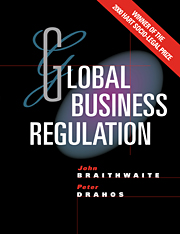15 - Drugs
Published online by Cambridge University Press: 04 August 2020
Summary
History of Globalization
Five Regimes
The history of the pharmaceutical industry is the history of its regulation. It is a history that, as we will show, leads to the creation of five totally separate regulatory regimes for different types of drugs:
1 an illicit drugs regime (heroin, cocaine, cannabis, ecstasy, LSD etc.) subject to totally globalized prohibition;
2 a prescription drugs regime which was globalizing slowly under US/WHO leadership until 1980 and somewhat faster under EC leadership since then;
3 national non-prescription drugs regimes which are not globalizing;
4 national alcohol regulation regimes which are not globalizing (prohibition here, regulation here, deregulation there);
5 national tobacco regulation regimes, elements of which are progressively globalizing due to global social movement politics and globalizing enforcement of tort law.
In the nineteenth and early twentieth century in the West pharmacy was a family business, progressively subject to regulation by Pharmaceutical Societies. Pharmacists would mix their own medicines. Patent-medicine peddlers travelled the countryside with their wares or used local grocers as retail outlets. Some of these family businesses saw the opportunities in internationalizing. They created new products by learning from indigenous medicine in exotic places. Most of the large companies imported opium and coca leaves from places like India or Java. The new international companies found the tropics particularly rich sources of new biological materials in much the same way as they now find them sources of genetic materials.
Regulation favoured these international companies, crushing their small business competitors. Pharmacopoeias started more as recipe-books than as instruments of regulation as long ago as the fifth century BC in Greece (McCoy 1992: 239). Pharmacists, like cooks, could experiment with the basic recipes and market their innovations. It was the medical profession which crushed pharmacist control over advice to consumers on drugs (Willis 1983). In most Western countries, before the twentieth century was very old, the medical profession had successfully lobbied for laws to require potent drugs to be sold only on the prescription of a licensed medical practitioner. At the end of the twentieth century, developing countries are on the same trajectory, though for most of the world's poor the local pharmacist remains a more important source of therapeutic power and advice than the doctor or the transnational pharmaceutical company.
- Type
- Chapter
- Information
- Global Business Regulation , pp. 360 - 398Publisher: Cambridge University PressPrint publication year: 2000
- 2
- Cited by



